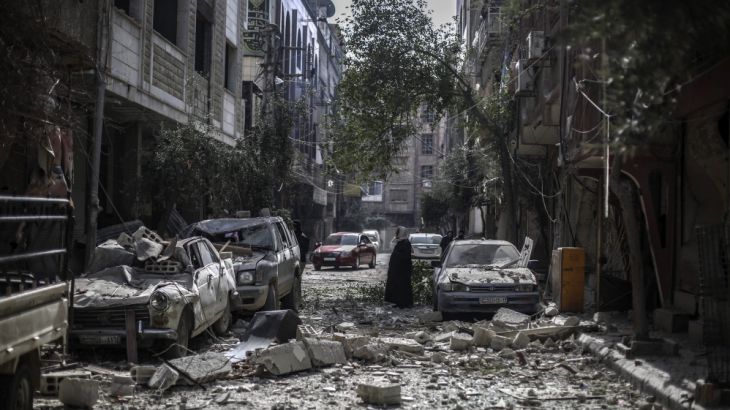The shifting lines in Syria
Syrians living in rebel-controlled areas fear a deal between Russia and the US has already been agreed.

There has been a shift, not only in the military and political balance of power in Syria, but many in the opposition believe the US and the West in general have tilted towards Russia’s position.
The mood is not optimistic among opponents of the Syrian government. Many Syrians living in rebel-controlled areas fear that a deal between Russia and the US has already been agreed.
“At the start of the conflict, the US publicly stood against (Syrian President) Bashar al-Assad. But at the same time they kept making false promises to the opposition. And now their true position is out in the open. The US is not standing against Assad,” Bashir Hawi, a Syrian living in a rebel-held district in Aleppo city, said.
“They are accepting him on the negotiating table and consider him the leader.”
His sentiment is echoed by many.
Just days before the Geneva talks were originally scheduled to begin, opposition leaders went as far as to accuse US Secretary of State John Kerry of pressuring the Saudi-based High Negotiations Committee (HNC), the main opposition body, to attend the Geneva talks
Washington was forced to deny the accusation.
The HNC has been demanding the implementation of articles in UN Security Council Resolution 2254, which calls for an end to attacks against civilians, indiscriminate use of weapons, the release of arbitrarily detained people and safe and unhindered access to aid agencies before it holds negotiations with the government.
The US has said those demands are legitimate but it made clear that there should not be any preconditions to attending the talks.
The administration believes the opposition should go to Geneva and should do so “without preconditions. We don’t want these demands or preconditions – the ceasefire, end to barrel bombing and also humanitarian access to some of these areas – to stand in the way of getting that process going”.
The group says its demands are not preconditions and after much delay decided to go to Geneva – “not to negotiate but to see UN resolution 2254 enforced,” Salim al-Muslet, the HNC spokesman, said.
Many diplomats doubt that the government and its backer, Russia, will agree to stop a military campaign that has made gains on the ground. The opposition has not been defeated but it is now on the defence.
In recent weeks, the government and its allies have been able to take strategic ground in the province of Latakia, in the so-called Southern Front, and many of the rebel strongholds around the capital, Damascus are under siege.
This has forced fighters to either abandon their positions or agree to truces under negotiated deals.
Russia’s military intervention has shifted the balance in favour of Assad. Many in the opposition believe the regime – which never even considered making concessions in the past – is in no mood to compromise.
And on the political front, the UN and Western powers are no longer talking about a transitional body with full executive powers as outlined in the Geneva communiqué. There is now talk of a national unity government which would mean a power-sharing deal.
UN special envoy Stefan de Mistura didn’t give an explicit answer when asked whether a transitional body or a national unity government would be discussed. But he did say that “issues of governance will be discussed and the government will have to be an inclusive one”.
This alarmed many in the opposition since a partnership with what they call a “murderous regime” is for them a red line.
Nevertheless, the road map has been agreed. The international community is determined that the political process begins.
But it is still a long road before the warring sides start discussing a solution.
In the interim, the way forward will witness more violence – because for the time being, winning on the battlefield gives leverage at the table.